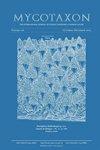温氏Claviceps humidiphila的新类型化及对C.bavariensis sp.nov.的识别。
IF 0.4
4区 生物学
Q4 MYCOLOGY
引用次数: 2
摘要
胡氏Claviceps humidiphila[lect C.purpurea var.phalaridis]以前是由Tanda在日本收集的正模和来自德国巴伐利亚州的表型的典型。基于翻译延伸因子1-α(TEF1-α)和RNA聚合酶II第二大亚基(RPB2)的系统发育分析表明,先前指定的德国表型与日本物种不同种。该德国标本被提议为一个新物种,即巴瓦里C.bavariensis,从模式位置(日本千叶)采集的一个标本被指定为胡氏灰蝶的新模式,取代了丢失的正模。本文章由计算机程序翻译,如有差异,请以英文原文为准。
Neotypification of Claviceps humidiphila and recognition of C. bavariensis sp. nov.
Claviceps humidiphila [≡ C. purpurea var. phalaridis] was previously typified with the holotype collected by Tanda in Japan and an epitype from Bavaria, Germany. Phylogenetic analyses based on translation elongation factor 1-α (TEF1-α) and RNA polymerase
II second largest subunit (RPB2) indicated that the previously designated epitype from Germany was not conspecific with the Japanese species. The German specimen is proposed as a new species, C. bavariensis, and a specimen collected from the type location (Chiba, Japan) is designated
as a neotype for C. humidiphila, replacing the lost holotype.
求助全文
通过发布文献求助,成功后即可免费获取论文全文。
去求助
来源期刊

Mycotaxon
生物-真菌学
CiteScore
1.20
自引率
10.00%
发文量
53
审稿时长
3 months
期刊介绍:
Mycotaxon is a quarterly peer-reviewed journal exclusively devoted to all phases of the taxonomy and nomenclature of fungi (including lichens). All articles are peer-reviewed by specialists prior to acceptance. Publication is open to all persons. Authors prepare their own article after having received critical comments from pre-submission reviewers .The journal is published with one volume each quarter. Articles are accepted in English only, with summaries or abstract in any language(s).
 求助内容:
求助内容: 应助结果提醒方式:
应助结果提醒方式:


